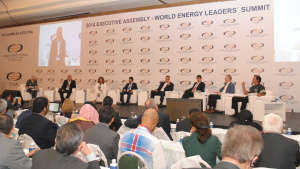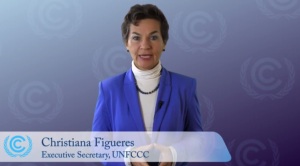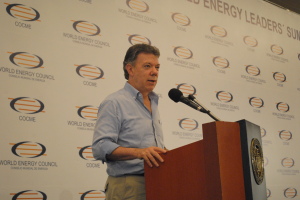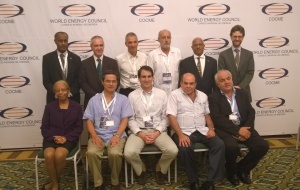
The World Energy Leaders’ Summit (23 October) within the Assembly provided a platform for the public and private sectors to carry out dialogue based around the framework of the energy trilemma: energy security, energy access, and environmental sustainability.
World Energy Council Chair Marie-José Nadeau opened the Summit emphasising the importance of regional integration in the agenda.
“In all regions, be it Latin America, North America, Europe or Asia, efficient energy flows are the key to both security and increased prosperity,” she said.
Recognising that energy production and use is “the biggest single cause of the rise in greenhouse gases”, she urged fast-growing economies to “grab the opportunities offered by new technologies”.
Christiana Figueres, Executive Secretary of the UNFCCC, told delegates in a video message: “The interlinked challenge of energy, economic growth, and environmentally sound development has never been more clear, and the benefits of rising to meet this challenge have never been better.”

She implored the attending government ministers and business leaders to “support the new universal climate change agreement” which is hoped to emerge at the 2015 COP Paris climate conference.
President Juan Manuel Santos of Colombia spoke at the Summit on 23 October accompanied by Vice President German Vargas Lleras and the Minister of Mines and Energy, Tomás González.
Commenting on Colombia’s improved position in the upcoming Energy Trilemma Index, President Santos said that Colombia considers the energy trilemma “a very valuable roadmap for us to continue strengthening our energy sector.”
In the 2014 Energy Trilemma Index – to be revealed in full on 24 November – Colombia advances 8 places globally, moving to 16th place among 129 countries in terms of the sustainability of its energy system.
“We feel very proud that an institution as important as the World Energy Council should say in its annual report that Colombia is a country that has ‘demonstrated what can be achieved thanks to well-conceived and well-executed policies’,” the President said, citing the comment made by Joan MacNaughton, Executive Chair of the Trilemma work, who earlier revealed Colombia’s new position.

At the Summit the President also laid out the challenges for the Colombian sector to 2018, but reiterated that “guaranteeing energy sustainability is a shared task” among nations.
Providing people with access to energy – to enable development and livelihoods – is why it is important for governments to be working side by side with the energy sector, he added.
More than 700 delegates from nearly 70 countries attended discussions on energy integration, resource diversification, and decentralised energy for Latin America and beyond. The speakers included 20 ministers and government officials (from Algeria, Belize, Bolivia, Colombia, Dominican Republic, Ecuador, Ethiopia, Guatemala, Honduras, Iran, Mexico, Peru, Russia, Trinidad and Tobago, UAE, Uruguay, and USA) plus chief executives and heads of international organisations.
On 24 October, ministers from Latin America took part in a private roundtable to hold talks over regional integration of the sector (see news release, in Spanish). The Colombian Minister of Mines and Energy, Tomás González, moderated the roundtable discussion which marked the start of negotiations between Bolivia and Peru over interconnecting the gas pipelines of the two countries.

Minister González commented on the Summit outcomes: “The Cartagena summit was very positive in terms of attendance, in the quality of the discussions and in the lessons learnt by both countries and companies,” adding that it is “very clear that there is a consensus” over the importance of energy integration.
Dr Christoph Frei, Secretary General of the World Energy Council, said the meeting came at an important time for the energy sector. “The discussions we had were important in moving the dialogue on regional integration in Latin America, on climate change, and on Sustainable Energy for All from those who want to those who can,” he said.
The World Energy Leaders’ Summit also hosted parallel events including a private CEO roundtable (23 October); the Energy Trilemma Summit (22 October), which focused on Latin American energy issues; and the Future Energy Leaders’ Summit, where 30 of the WEC’s young energy professionals gained exclusive access to the insights and wisdom of senior international energy experts.
On occasion of the events the WEC’s Future Energy Leaders (FELs) unveiled the report, “Alternative Transport Fuels: consumer attitudes in the Latin America and Caribbean region”. The study, conceptualised and conducted by a taskforce of FELs, finds that 73% of Latin America consumers are willing to pay more for alternative transport fuels.
The World Energy Leaders’ Summit took place within the backdrop of the Council’s annual Executive Assembly, which saw the leadership and member countries of the World Energy Council gathering to discuss and steer the direction of the organisation.
Among the decisions made during the Executive Assembly, Abu Dhabi won the bid to host the 2019 World Energy Congress in a vote by the World Energy Council’s member countries. The UAE’s win represents the first time that the Congress will be held in a Gulf State country.
The World Energy Council also announced that the 2016 World Energy Congress in Istanbul, Turkey, will be held from 10 to 13 October 2016. The World Energy Congress is the premier triennial gathering of the energy sector.
The week-long 2014 Executive Assembly and its events were made possible by the generous support of COCME, the WEC’s Colombian member committee.





